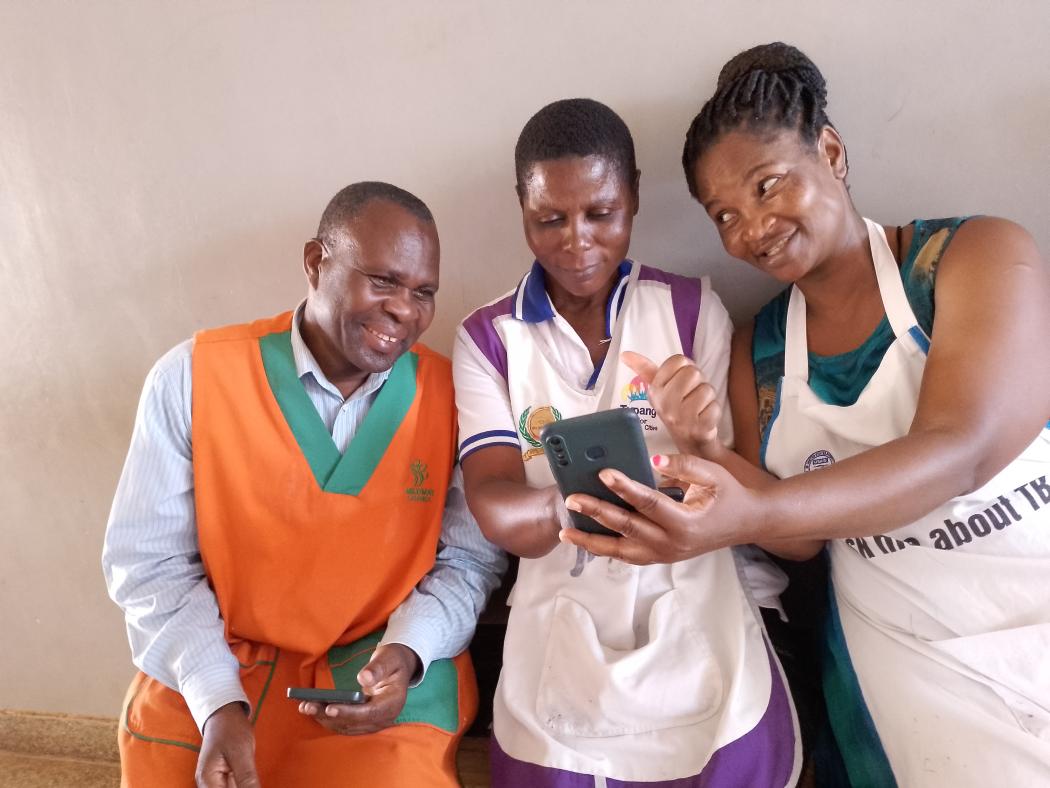How E-Cash is Improving Payment and Motivation of Health Workers in Uganda

Village health team workers in Wakiso, Uganda receive their stipends via E-Cash. The improved efficiency of payments through E-Cash has boosted health worker morale. Photo by Benon Tumwine, UHSS Project.
We want to see #SafeSupportedHealthWorkers in every community. New digital payments support their financial protection and inclusion.
The emergence of digital payments has revolutionized remuneration for public health campaigns in Uganda, improving efficiency and increasing health worker morale, particularly among village health teams (VHTs*) who are at the frontlines of Ugandan public health.
Traditional remuneration for village health teams
VHTs—typically consisting of women from the community—are a vital link to the health system. They conduct household outreach and community dialogues to promote health and prevent disease, support home care of simple illnesses, and refer people for services, largely on a volunteer basis.
Health campaigns often leverage VHTs for extra work with a cash stipend to mobilize communities in a short period of time, providing VHTs with some financial support for their valuable work. However, cash disbursements for health campaigns can result in VHTs waiting weeks or months for compensation or traveling a long distance to receive their stipends.
Transitioning to digital payments
The COVID-19 pandemic demanded mass mobilization of VHTs—between 400 and 1,000 per district in over 135 districts—to promote COVID-19 protocols and refer people for services. Since Uganda’s public financial management regulations limit districts to cash disbursements of UGX 5 million per week (about $1,275) or 40 million per month (about $10,000), delayed and incomplete payments to health workers were hampering COVID-19 prevention and response activities and affecting the morale of frontline health workers.
With support from GAVI, UNICEF, World Health Organization, World Bank, USAID’s Uganda Health Systems Strengthening (UHSS) project led by Palladium, and other partners, the Government of Uganda transitioned from cash to digital payments (E-Cash) to pay VHTs.
Uganda’s adoption of E-Cash involved a public-private partnership with Stanbic Bank. Stanbic hosts the platform and, in collaboration with the Ministry of Health and UHSS, provides technical experts to train and mentor district officials to teach accounting officers, auditors, and other government staff on how to collect, clean, and review health worker payment data, and approve payments. The UHSS project has provided follow-on mentorship to ensure the system is properly understood and used. Stanbic Bank benefits through a 1% transaction fee (paid by the government), while the government benefits from reduced delays in reconciliation, fraud, and loss of funds compared to cash payments.
Direct benefits of E-Cash
This change was highly successful for districts like Wakiso, located just outside Kampala. Within a month of deploying the E-Cash platform for COVID-19 work in June 2022, Wakiso was able to process payments of UGX 600 million (about $158,000) to 800 VHTs and 300 other health workers. The improved efficiency of payments through E-Cash increased health worker morale.
“We have received our money on time without challenges,” says Agatha, a nurse at Nshani Health Center. “As a result, we are motivated to work more.”
Jackline Nakayima, a VHT in Kira, prefers E-Cash “because it is transparent, and I know how much money I will be paid.”
E-Cash improves the management of public funds as well. “It facilitated the timely submission of accurate accountabilities,” says Dr. Mathias Lugoloobi of the Wakiso District Health Office. “This has enabled us to have enough time to budget and implement other health activities and reduce the possibility of audit queries.”
Uganda is now implementing E-Cash for other public health campaigns. During a recent malaria initiative (December 2023 – January 2024), the West Nile region disbursed over UGX 5.2 billion (about $1.27 million) to health workers for an indoor residual spraying (IRS) campaign.
Indirect benefits spur inclusion
While the efficiencies of digital payments for both frontline health workers and health program managers are easy to see, there are other positive spill-over effects that will also fuel development. Since most VHTs are women—88% of VHTs were women in a recent DHPIR study in Wakiso—and usually in the lower economic quintiles, E-Cash is helping to drive financial and civic inclusion.
As part of the transition to E-Cash, UHSS worked with district leaders to help VHTs obtain national identity cards. This simple step allows them to register a SIM card in their name and receive digital payments. Having a national ID also allows VHTs to participate in entrepreneurship and livelihood programs (e.g., Uganda’s Women Entrepreneurship Programme and Emyooga), receive benefits under Uganda’s Parish Development Programme, access legal and judicial processes, and vote. Furthermore, since mobile money accounts have simpler registration and documentation requirements than traditional bank accounts, no fees or minimum balance, and don’t require travel, E-Cash expands women’s access to financial services, such as credit and savings accounts, and bill payment services, giving them more control over their personal finances.
Improved programmatic efficiencies
Similar to other digital innovations, connectivity and the need for computer literacy among health program managers are some of the barriers to fully implementing E-Cash. However, the programmatic efficiencies are undeniable and worth further investment. It used to take up to two years to account for funds for an immunization campaign; now this can be done in a much shorter time. For the Integrated Child Health Days in October 2023, districts accounted for 75% of funds within five months. For a 2023 IRS campaign, all 13 districts accounted for 95% of advanced funds within three months.
“It will soon take only one to two months to process and account for these health campaign funds,” says Thomas Maina, Chief of Party, UHSS project. “This means that resources are being used more efficiently leading to better health outcomes for communities. E-Cash is not just about payments, it is more about transforming the way we support health workers to deliver health care.”
*In Uganda the acronym VHT is used for village health teams and individual village health workers.
